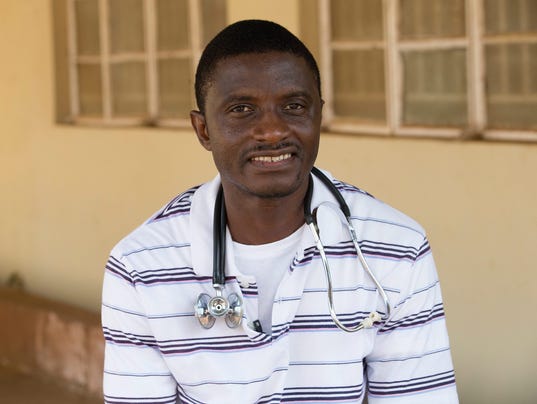
A surgeon who initially tested negative for the deadly Ebola virus in Sierra Leone before testing positive days later died Monday in Omaha, Nebraska Medical Center announced.
Martin Salia, whose family lives in Maryland, was flown to Omaha from Sierra Leone on Saturday and rushed to the medical center's specialized Bocontainment Unit. He died about 36 hours later.
"It is with an extremely heavy heart that we share this news," Phil Smith, medical director of the Biocontainment Unit at the hospital said. "Dr. Salia was extremely critical when he arrived here, and unfortunately, despite our best efforts, we weren't able to save him."
Smith said Salia tested negative for the virus on Nov. 7, in the early days of his illness. Smith said "false negative" test results are possible in the first days of symptoms when the viral load is relatively low. Salia ultimately tested positive for the virus Nov. 10.
Daniel Johnson, director of critical care at Nebraska Medical Center, said Salia was critically ill when he arrived at the hospital, where the medical team quickly had to combat kidney and respiratory failure. Salia was placed on dialysis, required a ventilator and received plasma from a surviving Ebola patient, Smith said.
Multiple medications included experimental ZMapp therapy, a new drug that has shown promise in fighting the disease.
"We used every possible treatment available to give Dr. Salia every possible opportunity for survival," Smith said. "As we have learned, early treatment with these patients is essential. In Dr. Salia's case, his disease was already extremely advanced by the time he came here for treatment."
Salia is the second person to die of Ebola in the United States. A Liberian man living in Texas, Thomas Eric Duncan, contracted the disease in his native country but was not diagnosed until after his return to Dallas. He died Oct. 8. Eight other people treated for the disease in the United States, including two at Nebraska Medical Center, survived.
The U.S. Embassy in Freetown said Salia paid for his evacuation. The travel costs and care of other Ebola patients flown to the U.S. were covered by the groups they worked for in West Africa.
Salia's wife, Isatu Salia, said her husband believed he had malaria or typhoid after initially testing negative for Ebola. Salia said her husband worked frequently in Africa because he felt he was needed there, she said. Salia had been working primarily at a hospital in Freetown that is not an Ebola treatment unit, but Salia worked in at least three other facilities in Sierra Leone, officials said.
The medical crew transporting Salia, 44, to Nebraska had determined he was critically ill and "possibly sicker than the first patients successfully treated in the United States."
Patients infected with the Ebola virus require a large number of staffers and around-the-clock care. Nebraska Medical Center has one of four U.S. special biomedical facilities, born in the aftermath of the 2001 terrorist attacks, actually designed to protect against bioterrorism. The others are Emory University Hospital in Atlanta, St. Patrick Hospital in Missoula, Mont., and the National Institutes of Health in Bethesda, Md.
Ebola has killed more than 5,000 people in West Africa, mostly in Liberia, Sierra Leone and Guinea.
"We're very grateful for the efforts of the team led by Dr. Smith," Isatu Salia said Monday. "In the short time we spent here, it was apparent how caring and compassionate everyone was. We are so appreciative of the opportunity for my husband to be treated here and believe he was in the best place possible."
Contributing: Liz Szabo, USA TODAY; Associated Press
Source: http://www.usatoday.com/story/news/nation/2014/11/17/ebola-death-martin-salia/19162043/


No comments:
Post a Comment